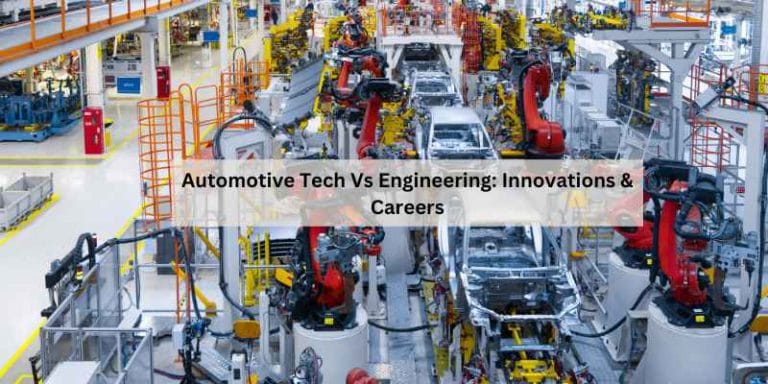How Automotive Technology Is Shaping the Future of Travel
Automotive technology refers to the study of self-propelled vehicles and involves the creation, design, and repair of vehicle technology. It encompasses various aspects such as engine systems, mechanics, engineering, and computer technology.
The job of an automotive technician is challenging, requiring rigorous training sessions to develop hands-on skills. Despite the difficulty, pursuing a career in automotive technology can lead to a range of opportunities in the automotive and machining industry, including auto repair and sales.
By obtaining an automotive technology degree, students can acquire the necessary skills and knowledge for various roles within the automotive industry. These programs provide education on inspections, maintenance, and the overall functioning of vehicles. Overall, automotive technology courses contribute to STEM education and equip individuals with the skills needed to succeed in the automotive field.
The Dawn Of Autonomous Vehicles
The dawn of autonomous vehicles has brought about significant advancements in automotive technology. The current state of self-driving cars is rapidly evolving, with continuous safety protocols being implemented to ensure the well-being of passengers and pedestrians. Moreover, AI advancements have played a pivotal role in enhancing the capabilities of autonomous vehicles, making them more efficient and reliable. These developments have the potential to revolutionize the way we commute and travel, paving the way for a future where autonomous vehicles are the norm.
Electrification Of The Auto Industry
The automotive industry is experiencing a major shift towards electrification, particularly with the surge of electric vehicles. This transition has significant impact on the environment and economy. Electric vehicles are contributing to reduced emissions and environmental sustainability. Moreover, the development of charging infrastructure and government incentives are driving the growth of electric vehicle adoption. From an economic perspective, this shift is creating new job opportunities and investment potential in the automotive sector. The electrification of the auto industry is reshaping the way we perceive transportation and its role in sustainable development.
Connectivity And In-car Technology
Explore the seamless integration of connectivity and in-car technology, revolutionizing the automotive industry. From advanced infotainment systems to smart navigation and remote vehicle management, automotive technology enhances the driving experience, making vehicles safer, more efficient, and connected than ever before.
| Connectivity and In-Car Technology |
| From Infotainment to Telematics |
Automotive technology has come a long way since the days of simple mechanical systems. Today’s vehicles are equipped with a wide range of advanced features that make driving safer, more comfortable, and more connected. From infotainment systems that offer streaming music and video to telematics systems that can remotely monitor vehicle performance, connectivity and in-car technology are transforming the driving experience. One of the key drivers of this transformation is the Internet of Things (IoT), which enables vehicles to communicate with other devices and systems, including traffic lights, road sensors, and other vehicles. This connectivity allows for real-time monitoring and analysis of traffic patterns, weather conditions, and other factors that can impact driving safety and efficiency. As automotive technology continues to evolve, we can expect to see even more innovative features that enhance the driving experience and make our roads safer and more efficient.
Advanced Driver-assistance Systems (adas)
Automotive technology has significantly advanced with the introduction of Advanced Driver-Assistance Systems (ADAS), enhancing road safety. The evolution of ADAS features has led to improved driving experiences and increased safety measures. These systems have revolutionized the automotive industry by incorporating technologies such as adaptive cruise control, lane departure warning, and automatic emergency braking. As a result, vehicles are now equipped with capabilities that enable them to detect potential collisions, maintain safe distances, and provide alerts to drivers. The continuous development of ADAS features highlights the commitment to creating safer roads and reducing the risk of accidents.
The Revolution In Vehicle Design
| How Automotive Technology | The Revolution in Vehicle Design |
|
Aerodynamics and Efficiency
Automotive technology has revolutionized the design of vehicles, especially when it comes to aerodynamics and efficiency. Today, engineers are using advanced technologies to design vehicles that can move through the air with minimal drag and resistance. They are also using lightweight materials to reduce the weight of the vehicle, which in turn improves fuel efficiency. This has led to the development of electric and hybrid vehicles that are not only more environmentally friendly, but also more efficient than their traditional counterparts. |
|
|
Materials and Manufacturing Innovations
In addition to aerodynamics and efficiency, automotive technology has also brought about significant improvements in materials and manufacturing processes. Engineers are now using advanced materials such as carbon fiber, aluminum, and magnesium to make vehicles lighter and more fuel efficient. They are also using 3D printing technology to manufacture parts and components with greater precision and efficiency. These innovations have not only led to better-performing vehicles, but also to a more sustainable and environmentally friendly automotive industry. |
|
Smart Infrastructure Integration
Smart infrastructure integration in automotive technology enhances connectivity and communication between vehicles, traffic signals, and road systems. This integration optimizes traffic flow, improves safety, and enables efficient energy management, ultimately revolutionizing the driving experience.
The Impact On Automotive Careers
Automotive technology is the study of how self-propelled vehicles move and refers to the creation or design of vehicle technology and the remediation or repairs required. This can involve the engine and other systems, engineering, mechanics, and computer technology. The job of an automotive technician is extremely challenging, and vigorous training sessions can help grasp hands-on training skills. Pursuing automotive technology education can prepare students for various careers in the automotive and machining industry.
Challenges And Ethical Considerations
|
Automotive technology has revolutionized the industry, but it also brings several challenges and ethical considerations. One of the main concerns is cybersecurity in connected cars. With vehicles relying on advanced technology, they become vulnerable to cyber attacks. This can put the safety of passengers at risk, and it’s crucial for manufacturers to take measures to prevent these attacks. Another ethical dilemma is related to autonomous decisions. As self-driving cars become more prevalent, they will need to make split-second decisions that could mean life or death. This raises questions about who is responsible for these decisions and how they should be made. Overall, while automotive technology offers many benefits, it’s essential to address the challenges and ethical considerations that come with it. |
Frequently Asked Questions
Is Automotive Technology Hard To Learn?
Automotive technology can be challenging to learn, but with proper training, you can acquire the necessary skills. Hands-on training sessions are essential for grasping the practical aspects of the job. Becoming an auto mechanic requires dedication and hard work, but it is achievable with the right education.
What Does Automotive Technology Do?
Automotive technology is the study of how vehicles move and involves designing and repairing vehicle technology. It includes engine systems, mechanics, engineering, and computer technology. Becoming an automotive technician can be challenging, but with proper training, you can acquire the necessary skills.
The field offers various career opportunities in the automotive and machining industry.
What Degree Do You Get From Uti Automotive?
UTI automotive offers a diploma or certificate program in Automotive Technology.
How Long Is The Uti Automotive Program?
The UTI automotive program is 51 weeks long. It offers vigorous training sessions to help students grasp hands-on training skills and prepare for a variety of careers in the automotive industry. With a focus on mechanics and technology, the program covers topics such as automotive safety systems, engine rebuild, and braking systems.
Conclusion
Automotive technology plays a crucial role in the modern world. It encompasses the study of self-propelled vehicles and involves the creation, design, and repair of vehicle technology. Becoming an automotive technician may be challenging, but with proper training, one can acquire the necessary skills.
The field offers a variety of career opportunities in the automotive industry, including auto repair and sales. Pursuing an automotive technology degree equips students with the knowledge and skills needed to excel in this dynamic field. So, if you have a passion for cars and technology, automotive technology could be the right path for you.







